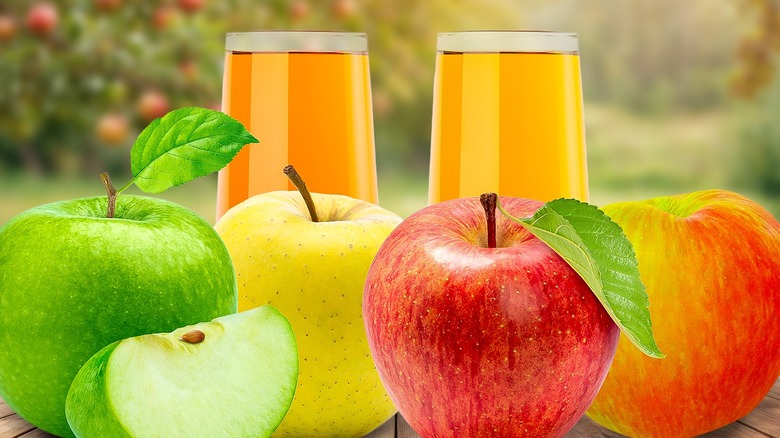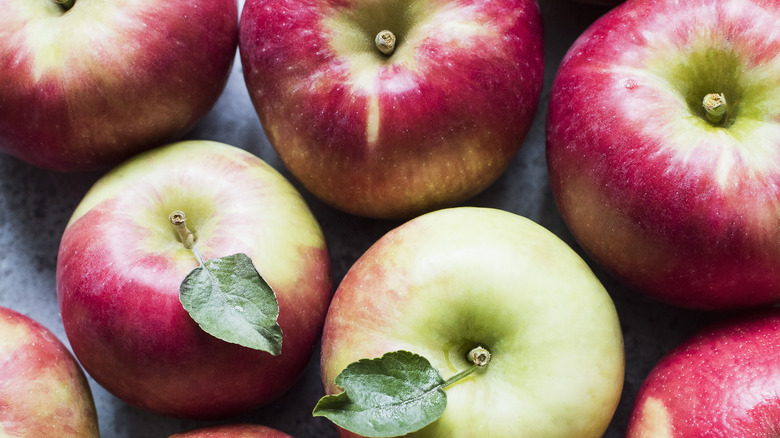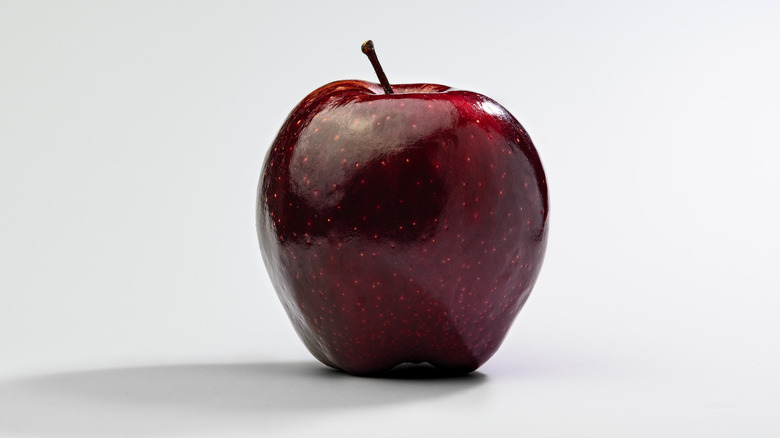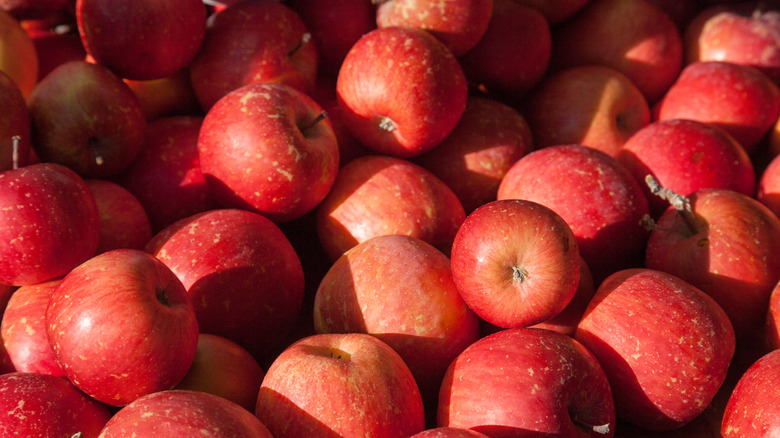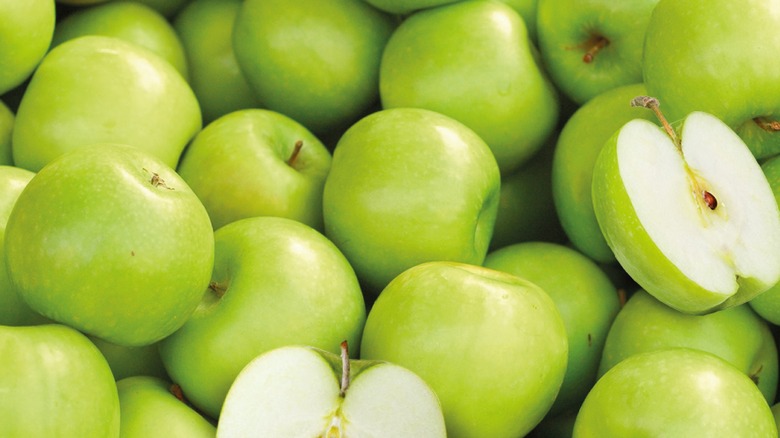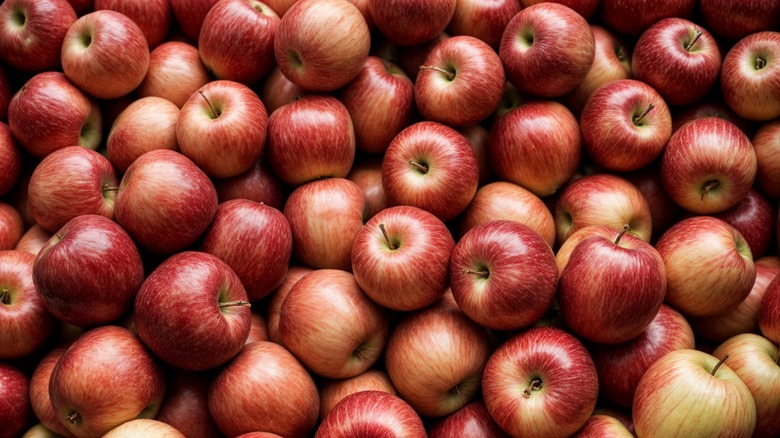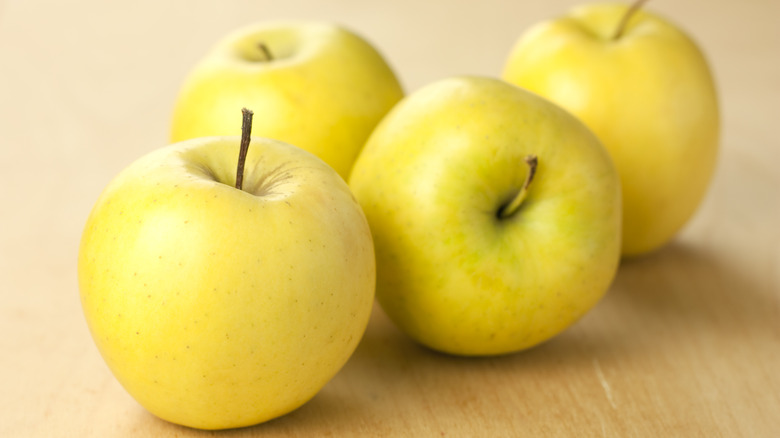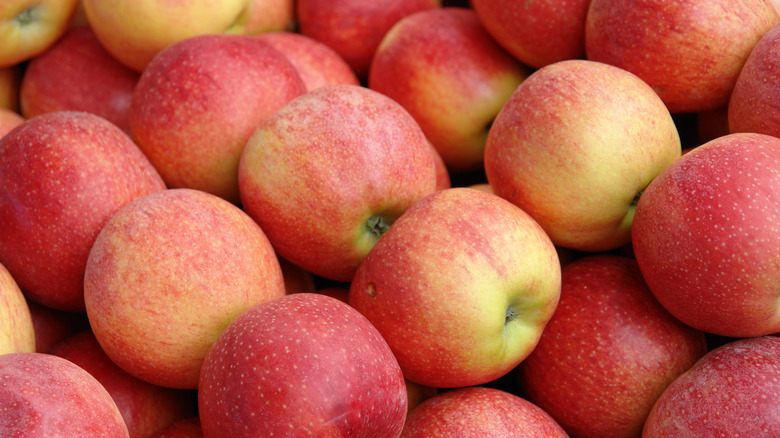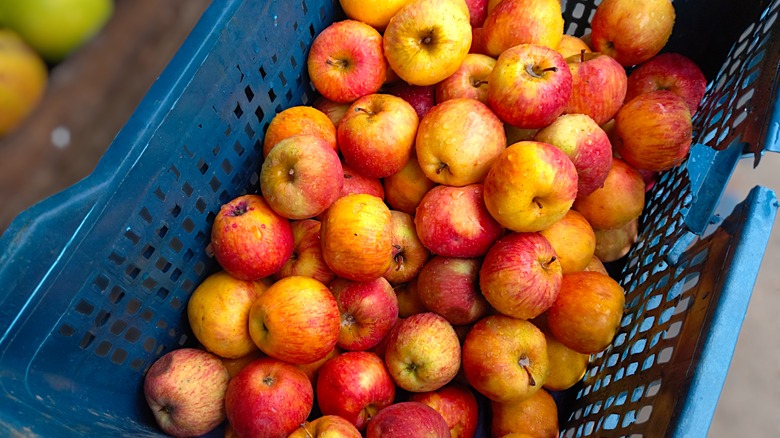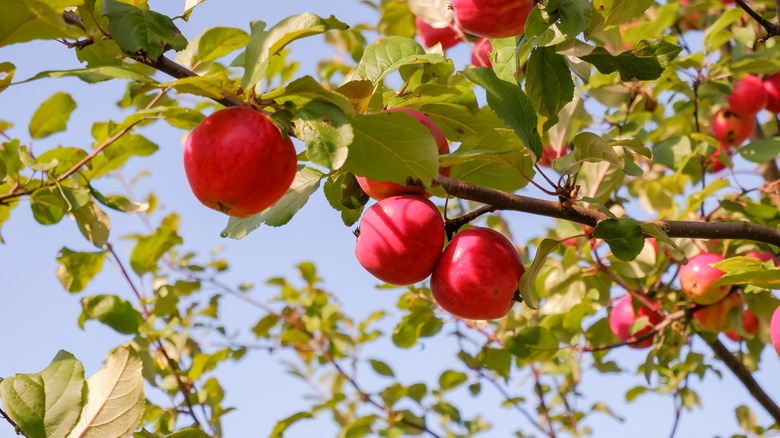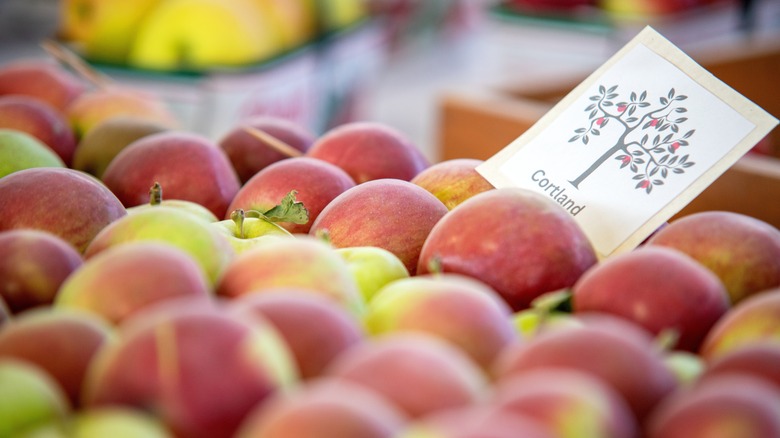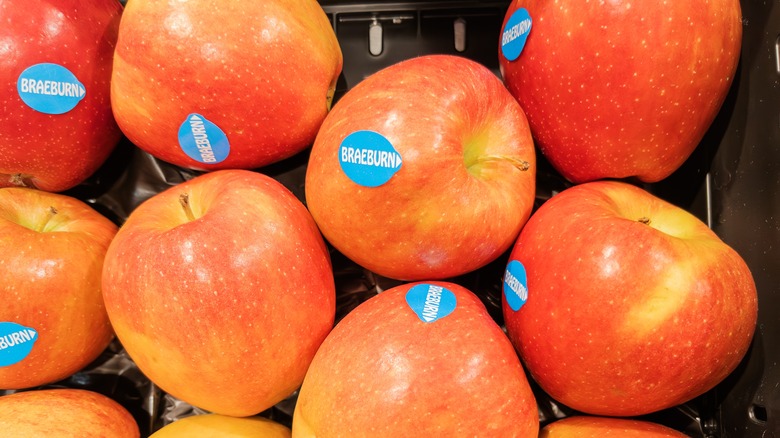6 Absolute Best Apple Varieties For Juicing And 5 To Avoid
Not all apples are created equal, especially when it comes to juicing. I've worked with plenty of varieties in the kitchen. Some are better for baking, others for snacking. Juicing is a whole other story. And with so many types out there, you've got to sort through some serious slush to get to the good stuff.
While some varieties deliver the perfect blend of sweetness, tartness, and crisp juiciness, others can leave you with a bland, watery, or even sour result. Whether you're looking to make a refreshing glass of apple juice on its own or create the perfect blend for a juice concoction, choosing the right apple can make all the difference.
In this guide, I've selected the best and worst apples for juicing based on a few essential factors: texture, juiciness, and flavor balance. Crisp apples with high juice content and a well-rounded sweet-tart profile made the cut as the "best" varieties. These apples produce a smooth, vibrant juice that's refreshing and full of flavor. On the flip side, apples that are too soft, mealy, or lacking in acidity were listed as ones to avoid, as they lead to grainy, flavorless, or watery juice. Whether you're new to juicing, looking to improve your apple juice game, or juicing for apple cider, this guide will help you select the right apples to create the most delicious, refreshing juice possible. Remember: The juice is worth the squeeze.
Best: Honeycrisp
When it comes to juicing, Honeycrisp apples are the gold standard. As a professional cook, I've used Honeycrisps in everything from apple pies (which you shouldn't slice into too soon) to sauces, and their incredible juiciness makes them perfect for apple juice. These apples are known for their crisp texture and high juice content, making each sip of juice bright, refreshing, and packed with flavor.
Honeycrisps strike the perfect balance between sweet and tart, which is essential for great apple juice. You won't end up with something too sweet or too sour — the natural tartness adds a refreshing edge that balances out the sweetness. Plus, their juice has a clean, crisp finish, so it's just as great on its own as it is blended with other fruits.
What really sets Honeycrisp apart is its firm flesh. While some apples turn mealy during juicing, Honeycrisp apples maintain their structure, meaning you get a smooth, consistent juice with every press. And because of their high water content, you can get a larger yield from fewer apples, making them both efficient and delicious.
Whether you're making a simple, pure apple juice or mixing up a blend, the modern Honeycrisps are your go-to apple for a delicious, well-rounded juice. Their firm, crunchy flesh holds up well in the juicing process, giving you a smooth, flavorful result every time.
Avoid: Red Delicious
Red Delicious apples are, unfortunately, a prime example of what not to use for juicing. While they may be iconic with their bright red skin, their low acidity and soft, mealy texture make them a poor choice for juice. When you press Red Delicious apples, you'll likely end up with a flat, lackluster juice that's neither refreshing nor flavorful.
One of the key issues with Red Delicious is its lack of natural tartness. Acidity is essential in apple juice to create that crisp, refreshing taste, and without it, the juice often ends up overly sweet and one-dimensional. Red Delicious lacks that complexity, offering a sweetness that doesn't balance out with the bright, crisp flavor you get from better juicing apples.
Another issue is the texture. The flesh of Red Delicious is notoriously soft and mealy, which means that when juiced, it tends to result in a watery, grainy consistency rather than the smooth, crisp juice you'd expect from firmer varieties like Honeycrisp or Fuji. Not only is the juice itself less enjoyable, but you'll also find yourself needing to use more apples to get a decent amount of liquid — and the result won't be worth it. If you're aiming for apple juice that's bright, flavorful, and smooth, steer clear of Red Delicious. Their soft texture and lack of flavor complexity simply don't translate well in a juicer. Instead, opt for firmer, more acidic apples to get the best out of your juicing efforts.
Best: Fuji
Fuji apples are a fantastic choice for juicing, known for their incredible sweetness and firm texture. Originally bred in Japan, these apples offer a sugar-rich juice that's mild but undeniably delicious. The high sugar content means you get a naturally sweet juice without needing to mix in other ingredients for balance.
One of Fuji's standout qualities is its crisp flesh. This firmness not only makes them easy to juice but also ensures that the juice itself is smooth and not grainy or watery. You can expect a good yield from Fuji apples, as they're packed with juice, making them both efficient and flavorful for any juicing project.
Fuji apples work beautifully as a standalone juice, offering a bright and sweet flavor that's easy to enjoy on its own. However, their mildness also makes them excellent for blending with other fruits, especially if you want to tone down the tartness of varieties like Granny Smith or add sweetness to a more neutral juice base. Their versatility is part of what makes them a favorite in juicing circles. Whether you're juicing for a refreshing drink or looking to create a more complex fruit juice blend, Fuji apples deliver every time. Their consistent sweetness, firm flesh, and high juice yield make them a reliable go-to for any juice enthusiast.
Avoid: Granny Smith
Granny Smith apples are loved by bakers for their sharp, tart flavor, but when it comes to juicing, their intense acidity can be a bit overwhelming. While their bright green color and crisp texture might seem like they'd be a great addition to your juicing lineup, the truth is, they can make your juice far too sour if used on their own.
Granny Smith apples are tart, and without a sweeter apple to balance them out, the resulting juice can end up tasting more like a lemon than an apple. This high level of acidity, while great for adding a zesty bite to pies or salads, doesn't translate well to juice unless you're blending it with sweeter, juicier apples. If you're making a mix, a small amount of Granny Smith can add a nice tangy note, but it's not a great base apple for juicing on its own.
Texture-wise, Granny Smiths do hold up well during juicing due to their firmness, which is a plus. However, it's their overpowering sourness that knocks them out of the running as a top choice for juice. If you do love a tart juice (like myself), these might actually be the apples for you. But for a well-balanced juice, pair with another.
For a more universally appealing juice, you're better off opting for a milder apple variety that brings a sweeter and more balanced flavor to the table. Granny Smiths are best left for baking where their tartness can truly shine.
Best: Gala
Gala apples are one of the best apples for juicing, thanks to their naturally sweet and floral flavor. These apples are known for being light, crisp, and refreshing, making them an ideal choice for a juice that isn't too overpowering or acidic. The flavor is delicate yet sweet, which makes Gala apples a perfect choice for those who prefer a milder, more balanced juice that still packs plenty of natural sweetness.
One of the biggest advantages of Gala apples is their versatility. Their subtle flavor pairs wonderfully with other fruits, so whether you're juicing them on their own or mixing them with other fruits like pears, berries, or even a sharper apple like Granny Smith, you'll get a beautifully balanced juice. Gala apples also provide a good amount of juice thanks to their high water content, so you won't need to use as many apples to get a satisfying yield.
Their mildly sweet flavor also makes Gala a great option for kids' juice, or anyone looking for a lighter, less tart juice. Unlike more intense apples like Granny Smith or even Honeycrisp, Gala provides a smooth, consistent juice that works well as a base for mixed juices or as a refreshing drink all on its own.
Gala apples are a top choice for juicing whether you're juicing for a solo apple juice experience or looking to create blends with other fruits. Their soft sweetness and mild tartness deliver a juice that's light, refreshing, and easy to enjoy any time.
Avoid: Golden Delicious
While Golden Delicious apples might shine in certain culinary uses, they're not the best choice for juicing. Known for their mild sweetness and soft texture, I've found that these apples tend to produce a juice that is somewhat bland and watery. When you're looking for a flavorful, refreshing apple juice, the subtlety of Golden Delicious often falls short.
The main issue with Golden Delicious apples in juicing is their lack of acidity. Apple juice benefits from a balance between sweet and tart, and Golden Delicious apples don't have the sharpness needed to create a well-rounded flavor profile. Instead, their juice can taste overly mild, which doesn't provide the bold, crisp apple taste that most people expect.
Another drawback is their texture. Golden Delicious apples tend to become soft as they ripen (depending on where you get them) and when juiced, this can result in a less-than-smooth consistency. The juice may come out a bit grainy or thin, which isn't ideal if you're aiming for a clean, crisp apple juice.
If you love Golden Delicious apples, consider using them for baking or snacking, but when it comes to juicing, their soft texture and mild flavor won't deliver the vibrant, refreshing juice you're after. Opt for apples with a crisper texture and more pronounced flavor to ensure your juice has the depth and brightness that makes it truly enjoyable.
Best: Pink Lady
Pink Lady apples are a fantastic choice for juicing, thanks to their vibrant balance of sweetness and tartness. These apples have a firm, crisp texture, which translates into a smooth, refreshing juice with a bit of zing. Pink Lady apples stand out in more than just a Waldorf salad because of their well-rounded flavor profile — tangy enough to give the juice complexity, but with a sweetness that ensures it's never too sharp.
The juice from Pink Lady apples has a bright, lively quality that makes it ideal for juicing on its own or blending with other fruits. It's especially great if you enjoy a juice that has a little extra character — something with layers of flavor rather than a single-note sweetness. The natural acidity of Pink Lady apples helps enhance the overall taste, making the juice refreshing without being too sour or too sugary.
One of the reasons Pink Lady apples are so popular for juicing is their high juice content. These apples are known for being juicy, so you'll get a lot of liquid without needing to use a huge number of apples. Plus, the firm texture of Pink Lady apples ensures that your juice comes out smooth and clean, without the graininess that you might get from softer varieties. Whether you're juicing Pink Lady apples on their own or mixing them with other apple varieties, their balanced, tangy-sweet flavor will add a level of complexity to your juice that's hard to beat.
Avoid: McIntosh
McIntosh apples are a classic variety, beloved by many for their soft, slightly tart flavor. However, when it comes to juicing, McIntosh apples fall short due to their overly soft, mealy texture. While they make for a good snack or a great addition to applesauce, McIntosh apples tend to turn mushy when juiced, leading to a juice that's grainy and less than desirable.
The main issue with McIntosh apples is their tendency to break down quickly, which can result in a juice that's not smooth. Instead of a clean, refreshing drink, you may end up with a juice that feels more like a purée. This grainy texture isn't what you want when you're looking for a light, crisp apple juice. Additionally, McIntosh apples have a lower acidity compared to other varieties, which means their juice lacks the vibrant, tangy notes that make apple juice so refreshing.
Flavor-wise, McIntosh apples tend to be milder, and without that extra acidity, the juice can taste a bit flat. If you do choose to use McIntosh apples in your juicing, it's best to blend them with firmer, more acidic apples to help balance out the texture and flavor. But on their own, McIntosh apples aren't ideal for creating a smooth, flavorful juice.
For the best juicing experience, opt for apples with a firmer texture and a more balanced flavor. McIntosh may be a great apple for baking or snacking, but they simply don't hold up in the juicing department.
Best: Jonagold
Jonagold apples are an excellent choice for juicing, offering the perfect balance of sweetness and tartness that makes apple juice truly shine. A cross between Jonathan and Golden Delicious apples, Jonagold combines the best qualities of both varieties. The result? A crisp, juicy apple with a complex flavor profile that's ideal for making refreshing and flavorful juice.
One of Jonagold's standout features is its crisp texture, which produces a smooth and clean juice. Unlike softer apples that can create a grainy or watery result, Jonagold apples hold their shape during juicing, ensuring that your juice is smooth and enjoyable to drink. Their high juice content also means you get a generous yield with every apple, making them both efficient and delicious.
In terms of flavor, Jonagold apples hit that sweet spot between sweetness and tanginess. Their juice has a richness that comes from their natural sugars, but the underlying tartness keeps it bright and refreshing. This makes Jonagold apples a great standalone option for pure apple juice, but they also blend beautifully with other fruits for a more complex juice combination. Jonagold apples deliver on both taste and texture. Their versatility and well-rounded flavor make them a top contender for anyone serious about making great apple juice.
Avoid: Cortland
Cortland apples are great for eating fresh or adding to salads, but when it comes to juicing, they don't quite make the cut. These apples have a softer texture, which can lead to a juice that's more watery and lacking in richness. While Cortland apples are known for their mildly sweet flavor, their softness becomes a problem in the juicing process, often resulting in a juice that's thin and not as smooth as you'd want.
The texture issue is the main drawback with Cortland apples. Like other soft apples, they break down quickly when juiced, producing a juice that's grainy or slightly pulpy. If you're looking for a crisp, refreshing juice, this mealy consistency just won't cut it. You'll also find that Cortland apples don't produce as much juice as firmer varieties, meaning you'll have to use more apples for a lesser result.
Flavor-wise, while Cortland apples are pleasantly sweet, they lack the complexity needed to create a dynamic apple juice. Their mildness can lead to a juice that feels flat, without the balance of tartness and sweetness that makes a juice refreshing. While Cortland apples can be good for eating, their delicate nature doesn't hold up in the juicing world. If you're looking for a smooth, flavorful juice, stick with firmer apples that have a more balanced flavor profile. Cortland apples may be a great addition to your fruit bowl, but they fall short when it comes to juicing.
Best: Braeburn
Braeburn apples are a fantastic option for juicing, offering a complex flavor that combines sweet and tangy notes with a hint of spice. This unique mix gives Braeburn juice a richness that sets it apart from other apple varieties. Known for their firm, crisp texture, Braeburn apples produce a smooth, clean juice that's packed with flavor and has the right amount of acidity to keep things refreshing.
One of the key reasons Braeburn apples excel in juicing is their ability to strike the perfect balance between sweet and tart. The natural sugars in Braeburn apples provide a delightful sweetness, while their slightly higher acidity brings a lively, tangy kick to the juice. This combination creates a multi-layered flavor profile that's both bold and refreshing, making it an ideal choice whether you're juicing them solo or blending with other fruits.
Texture-wise, Braeburn apples hold up well under pressure. Their firmness ensures a high juice yield without the graininess or pulpiness that you'd get from softer varieties. The result is a juice that's crisp and full-bodied, with a depth of flavor that you'll notice in every sip. Whether you're making juice to enjoy on its own or to add a complex note to a blend, Braeburn apples are a top-tier choice. Their crispness, bold flavor, and well-balanced sweetness make them a reliable option for anyone serious about their apple juice.
